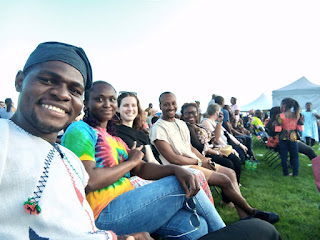I had been living with Michael and Theophilus for some time now. Reason was I rented an apartment in the housing units owned by the university, but I had to wait for the move-in date to allow the Housing Office complete some cleaning and maintenance work.
From the start I knew we would go along, but we got to know each other better during my stay with Michael and Theophilus. They’re like-minds. The house had an intellectual aura. We read, write, teach and meet at the living room and laugh over many things. Once a week we would visit Tolu’s family and have long conversation peppered with words such as “subjectivity,” “subjecthood,” “positionality,” “multiaxial mobility,” and “deterritorialized globality,” etc.
One day to my due date, I would have to buy some essentials things for my new home - utensils and crockery and toiletries. Michael, who had been my eyes, had a schedule on the day. He would not be able to go with me. But this wouldn’t be a problem. Accent and geography were no longer issues now. I had been speaking with customer service folk on the phone. I had even called offices and booked appointment. I had been going to school and coming back by myself.
I ordered a car to take me to the shop. Some minutes later my phone vibrated to indicate the driver was in close proximity. I picked my wallet and went outside. A minute or two the car arrived, an African-American woman in her 40s at the wheel. I slid to the back seat. As if on cue the woman mentioned my name. I was surprised she got it correctly. The little issue was on the accent, which can be forgiven for someone probably meeting the name in-person for the first time. When people wanted to talk to you, they make an overture like this. I was thinking in my mind what to do with her friendly opening.
“I was surprised, how you get the name correctly,” I said.
“I saw the name on my phone,” she replied. As she learned I was going for shopping she asked if I was moving to a new home. I told her yes. With a family? No. I had just arrived from Nigeria a month ago to start a program at UW-Madison.
“Are you a student?” she wanted to know.
“No, I teach.” Her face lit up with Black pride, how happy she was to hear this. She asked my plan after the program and advised I should come back for grad school. She offered some bits about her life for me to see. She is a single mother. She has three kids. All of them went to college. Her grandson is in Harvard studying journalism. She has an MA. I was nodding approval all the way. But I was even more surprised when she revealed her age and what she planned to do. At 56 she would soon go back to college for PhD. Now I can see why I needed to go to graduate school.
She dropped me at the shop. I did my shopping and returned home.
October 6
I gathered what few things I had and headed out to the car. Michael drove me to Eagle Heights and helped me deposited the items with another Nigerian. He proceeded to school. I walked to the Housing Office and collected the keys and papers.
I came back late evening from school to start moving my things to the apartment. It’s night and the middle of the week. Fellow Nigerians were busy with their work. I started moving my things alone. Later, Ali Baba helped me with the bigger ones, a bed frame and mattress.
I was taking the bull by the horn. I came to discover so many things I needed to buy were missing. I would want to use an item, say slice an onion while cooking, only to discover that I didn’t have a knife. I shouldn’t wait to have everything I needed before I moved in.
I set up the bed and sat down on the edge feeling nostalgic. The carton containing my books in one side. Two bags containing my entire life sat on the floor in the cabinet. The problem with knowing is that it gives clarity to your situation. I was taking an excursion into a life course theory and transition, like a bride leaving everything behind and arriving at her new home. We don’t pay attention to these transitions because they happen seamlessly within cultural frame and community.
I wen to the bathroom and performed ablution and came back and prayed. A faint rap came on the door shortly after. I dismissed it, thinking it’s on another door. Then another. I walked to the door and asked who it was. No answer. Another knock. I spoke this time with a rising tinge of exasperation. To hell with whoever it was since they weren’t answering. Just as I made to leave another knock grabbed me by the hand and held me back.
The answer came this time. I opened, and lo and behold, two police officers stood at the door. They introduced themselves and why they came. They’re from the UW Police Department. Neighbors called their office to say they had seen movement in the apartment they knew to be vacant. The police called the Resident Manager (Hall Admin) who said he knew nothing about moving-in. They’re here to check what’s happening. They asked permission to come in for checking. They followed me inside. They asked to see any of my ID. I showed them my UW ID and the rent papers that I collected at the Housing Office. They took my phone number and my date of birth. They asked if I had any question. Certainly I had, but I kept them to myself.
Madison, WI




